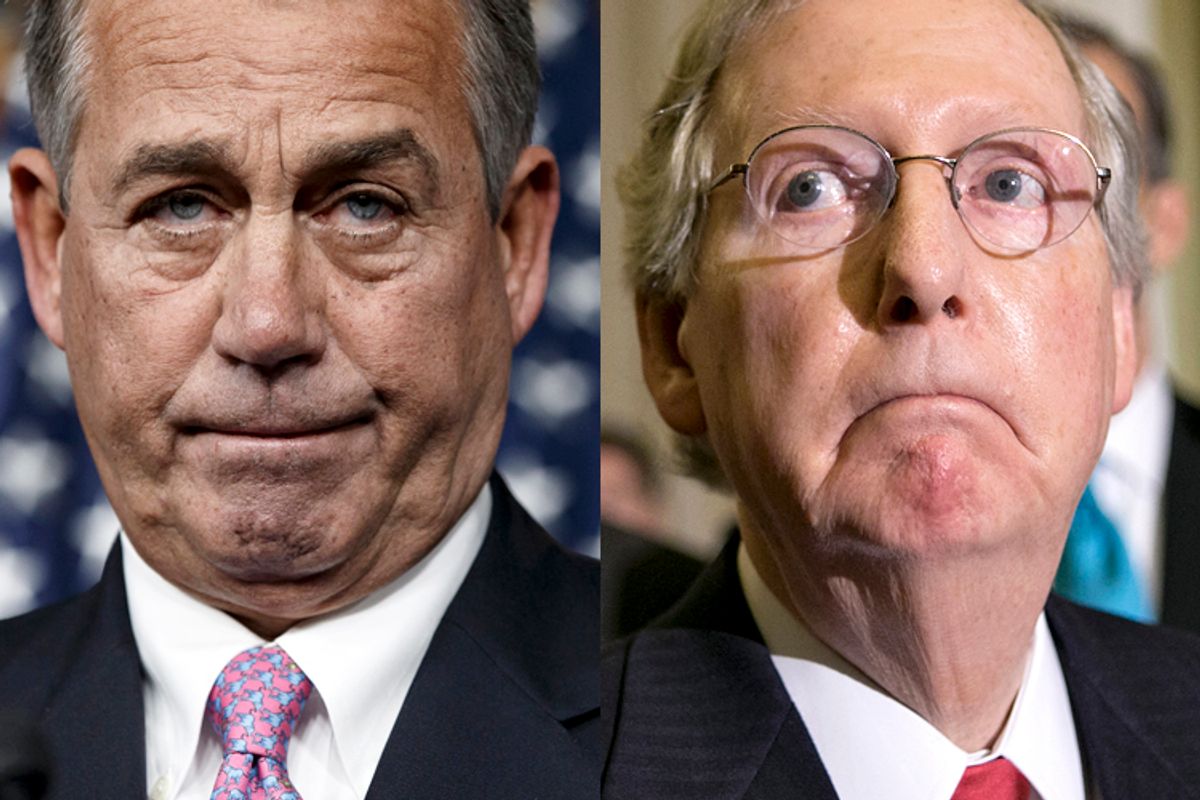It was always going to be this way. The House GOP’s scheme to undo President Obama’s immigration orders by taking Department of Homeland Security funding hostage was never going to work, and it was always a boneheaded political move that could nothing but backfire on the GOP. But they pushed forward regardless, and ever since then we’ve been on a slow but inexorable journey to this point – the point at which John Boehner would find himself backed into a corner with pretty much everyone in Congress arrayed against him in some way.
On Tuesday, one day after his fourth and final attempt to break a Democratic filibuster on the House DHS funding bill failed, Senate majority leader Mitch McConnell finally gave in. He signaled to the Democrats that he was willing to separate Obama’s immigration actions from DHS appropriations and consider a “clean” funding bill.
This was precisely what the Democrats had been demanding the entire time, and the only path available to McConnell to avoid shutting down DHS. Boehner, who’d been defiantly resisting overtures from Senate Republicans to pass new funding legislation, would finally be under pressure to make a choice: cave and pass a clean bill with the help of House Democrats; or resist for a while longer, absorb as much political damage as he could tolerate, and then cave and pass a clean bill with the help of House Democrats. At least, that’s what was supposed to happen before Harry Reid stepped in and gave Boehner a brief respite.
Reid, for reasons that are unclear, refused to take “yes” for an answer and attached conditions to McConnell’s offer to cave completely to the Democrats. Before he’d sign on to McConnell’s surrender, Reid wanted McConnell to obtain a pledge from Boehner that he’d agree to pass a clean funding bill through the House. Thus the Democrats had gone from the politically advantageous position of demanding a bill with no conditions to demanding conditions for a bill with no conditions. And that made no sense strategically – passing a clean funding bill would have put the same pressure on Boehner to act.
Reid backed down the next day and agreed to support McConnell’s clean bill, but he’d scrambled the political dynamic of the fight. Reid’s decision made it possible for the Associated Press to tweet this appraisal of the situation, which is completely backwards when viewed in the context of the broader DHS funding debate, but technically accurate when viewed through the narrow lens of the last two days:
[embedtweet id=”570652709138915328”]
Regardless, the Senate is determined to act, and now both Democrats and Republicans have rejected Boehner’s legislation tying DHS funding to the end of Obama’s immigration programs. Boehner will be under intense pressure to act, and he’ll also be under intense pressure to hold firm. Hardline conservatives in the House and outside activist groups are lashing out at McConnell for caving and threatening Boehner’s speakership if he follows suit. Meanwhile, Democrats and Republican moderates will be urging Boehner to give up the fight and agree to fund DHS. There’s already an excellent chance the agency will shut down before Congress can get its act together and pass a funding bill, and Boehner will also be feeling the political consequences of that.
Boehner will eventually cave – it’s what he does in these situations. The only question is how long he’ll drag it out.
And while we wait for Boehner to cave, there’s going to be a great temptation among reporters and pundits to favorably compare McConnell’s performance in this affair to the speaker’s shambolic rake-stepping. McConnell, after all, has a reputation as a dealmaker and savvy compromiser, and it’s easy to cast him as the key player in breaking the logjam in the Senate. Let’s please not pretend that’s what happened here.
McConnell has behaved only slightly less irresponsibly than Boehner. The only reason we’re hard up against the funding deadline in the first place is because we’ve had to endure the four predestined-to-fail cloture votes McConnell scheduled on the House-passed legislation, which was part of his silly plan to push blame for the looming shutdown off onto the Democrats. This whole sordid fiasco is as much McConnell’s fault as it is Boehner’s. He fought this pointless symbolic fight just as hard as the speaker did, and in the process brought a government agency to the brink of a shutdown – something he promised wouldn’t happen under his leadership. All that separates the two is the fact that McConnell was first to give up his fight against political reality.

Shares